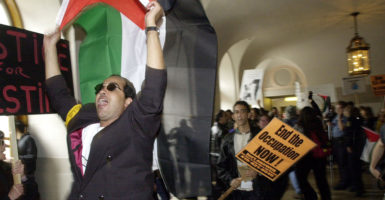A professor at the University of Michigan has come in for criticism after initially supporting a student’s application to study abroad and then rescinding that support after discovering the student’s intended destination was Israel.
The Washington Post reported that John Cheney-Lippold, an associate professor of American culture, received a student’s request for a letter of recommendation for a study abroad program last month. After quickly scanning the student’s application, Cheney-Lippold agreed to write the letter.
What is normally a routine request in the academic world, however, quickly turned both political and controversial when the student sent Cheney-Lippold the form letter for the application, listing Tel Aviv University in Israel as the educational institution at which she planned to study.
On Sept. 5, Cheney-Lippold informed Abigail Ingber—a junior at the university’s College of Literature, Sciences, and the Arts—that he could no longer write the letter of recommendation he had promised earlier.
“As you may know, many university departments have pledged an academic boycott against Israel in support of Palestinians living in Palestine,” he wrote. “This boycott includes writing letters of recommendation for students planning to study there.”
The boycott to which Cheney-Lippold was referring to was the “Boycott, Divest, and Sanctions” movement, which promotes the boycotting of Israel in protest of what its backers say is the Jewish state’s poor treatment of Palestinians.
The movement promotes direct and indirect boycotts, especially when they involve academic investment in companies that support or do business with Israel.
Less than two weeks after Cheney-Lippold sent his email to the student, Club Z, a California-based Zionist youth movement, posted a screenshot of the email on its Facebook page.
The email quickly drew criticism online, with the chief executive of the Anti-Defamation League calling the student a “victim of political bias.”
Cheney-Lippold told The Washington Post he has received death threats since the Zionist group published his email.
He said that he was mistaken in his email when he said the university was actively boycotting Israel. According to the Michigan-based media group MLive, the university’s board of regents declined to investigate divesting from companies doing business with Israel.
The university “has consistently opposed any boycott of Israeli institutions of higher education,” Kim Broekhuizen, a university spokeswoman, told The Washington Post.
Cheney-Lippold emphasized that his decision was political, rather than personal.
“I can’t prevent a student from going to Israel,” he said. “But everybody has the right to withhold something, and I chose to exercise that right based on what the movement needs from me as a solidarity activist.”
In his email, Cheney-Lippold asked the student to let him know “if you need me to write other letters for you.”
He later said that he didn’t think his decision would cause controversy. “I think [Ingber] deserved honesty,” he said. “But I didn’t realize declining to write a letter would have such a political effect.”
The university disputes Cheney-Lippold’s view of the situation, with its spokeswoman telling the Post: “Injecting personal politics into a decision regarding support for our students is counter to our values and expectations as an institution.”
Mike Gonzalez, a senior fellow at the Kathryn and Shelby Cullom Davis Institute for International Studies at The Heritage Foundation, took issue with the professor’s reasoning.
The professor is within his right to refuse to write a letter of recommendation. What is troubling are his views against the Jewish state, which he accuses of practicing apartheid.
He doubles down by issuing fatuous statements such as ‘I declined to write the letter because I believe in equality.’ This is fairly typical in the academy, sadly.
Israel, one of our closest allies, is the only democracy in the Middle East and the only country in the region that truly respects basic rights, such as freedom of speech, the press, conscience, and assembly.





























